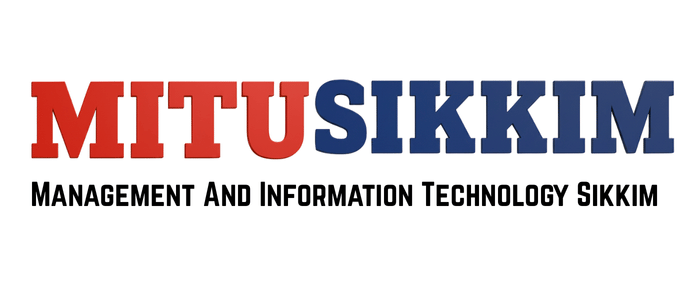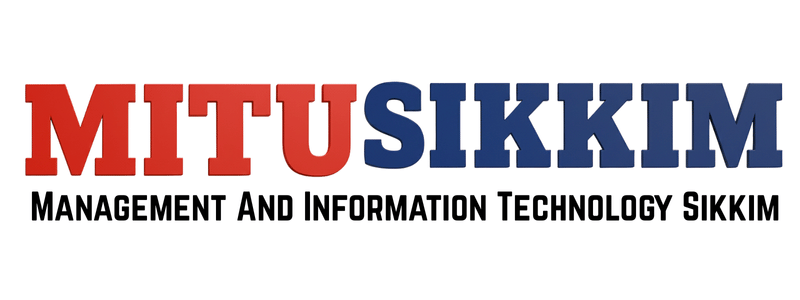BSc Environmental Science Distance Education Admission opens doors to understanding our planet’s complex environmental systems. This comprehensive program equips students with knowledge about pollution control, conservation biology, environmental chemistry, and sustainable development. MIT University Sikkim offers this UGC-DEB approved program designed for working professionals and students seeking flexible learning options.
Key Program Highlights:
- Duration: 3 Years (6 Semesters)
- Mode: Distance Learning with Online Support
- Total Fee: ₹52,500 for complete program
- Eligibility: 12th Pass with Science Stream (50% minimum)
- Application Period: 20 September 2025 – 30 November 2025
- No Entrance Exam Required – Merit-based admission
The program covers specialized areas including environmental impact assessment, climate change mitigation, waste management, and renewable energy systems. Students gain practical knowledge through virtual laboratories, field study modules, and industry-connected projects that prepare them for growing environmental sector opportunities.
BSc Environmental Science Distance Education Admission Process 2025-26
MIT Sikkim follows a streamlined admission process that prioritizes student convenience and accessibility. The university provides comprehensive support throughout the application journey.
- Merit-based Selection: Admissions based on 12th standard marks with no entrance examination requirement, making the process straightforward for all eligible candidates.
- Online Application System: Complete digital application process through MIT Sikkim’s official portal with document upload facility and real-time application status tracking.
- Affordable Application Fee: Registration fee of ₹500 covers complete application processing with no hidden charges or additional documentation costs.
- Expert Counselling Support: Free academic counselling sessions with experienced advisors to help students choose appropriate specializations and career paths.
- Multiple Payment Options: Flexible fee payment structure including installments, online banking, UPI, and traditional bank transfers for student convenience.
- Early Decision Advantage: Priority consideration for applications submitted before 15 October 2025 with faster admission confirmation and course material dispatch.
BSc Environmental Science Distance Education Admission Overview
The program addresses critical environmental challenges through interdisciplinary learning approaches that combine scientific theory with practical applications for sustainable development solutions.
- Comprehensive Curriculum Focus: Studies environmental chemistry, ecology, pollution control, biodiversity conservation, and environmental law to create well-rounded environmental professionals.
- MIT Sikkim Academic Excellence: State-of-the-art online learning platform with recorded lectures, interactive modules, virtual labs, and 24/7 technical support for seamless education delivery.
- Career-Ready Skills Development: Emphasis on environmental monitoring, data analysis, report writing, and project management skills highly valued by employers across environmental sectors.
- Industry Integration Benefits: Regular guest lectures from environmental consultants, government officials, and industry experts providing real-world insights and networking opportunities.
- Flexible Learning Schedule: Self-paced study options with weekend virtual classes, recorded sessions, and mobile-friendly content access for working professionals and students.
What is BSc Environmental Science Distance Education?
BSc Environmental Science through distance learning is a comprehensive undergraduate program that studies the interaction between physical, chemical, and biological components of our environment. Students explore how human activities impact natural systems and develop solutions for environmental challenges.
The curriculum integrates multiple scientific disciplines including chemistry, biology, physics, geography, and mathematics. Core subjects include environmental chemistry, ecology and biodiversity, pollution and waste management, environmental microbiology, and climate change science. Students also study environmental economics, policy making, and impact assessment methodologies.
The program structure includes theoretical foundations, practical applications, and research methodologies. Virtual laboratory sessions simulate real environmental testing procedures, while field study modules provide hands-on experience with environmental monitoring equipment and sampling techniques.
Distance learning format allows students to balance education with professional commitments while gaining expertise in emerging environmental technologies, renewable energy systems, and sustainable development practices that are increasingly important in today’s job market.
BSc Environmental Science Distance Education Admission Eligibility Criteria
MIT Sikkim maintains clear eligibility standards to ensure student success while providing accessible education opportunities for diverse backgrounds and career stages.
- Academic Qualification Required: Candidates must have completed 12th standard or equivalent from recognized boards including CBSE, ICSE, or state education boards with science stream subjects.
- Minimum Percentage Requirement: 50% aggregate marks in 12th standard for general category students, with 45% for reserved categories (SC/ST/OBC) as per government regulations.
- Science Stream Subjects: Must have studied Physics, Chemistry, and Biology/Mathematics in 12th standard to ensure foundational knowledge for environmental science concepts.
- No Age Limit Restrictions: Open admission policy welcomes students of all ages, making it ideal for working professionals seeking career transitions or skill enhancement.
- Merit-Based Selection Process: Admission decisions based on 12th standard academic performance with no separate entrance examination or interview requirements.
- Document Verification: Original academic certificates, identity proof, and category certificates (if applicable) required during admission confirmation and enrollment process.
BSc Environmental Science Distance Learning Fee
MIT University Sikkim offers competitive fee structure designed to make quality environmental education accessible to students from diverse economic backgrounds while maintaining high academic standards.
- Total Program Fee: ₹52,500 for complete 3-year program including all study materials, virtual laboratory access, examination fees, and digital library resources.
- Convenient Payment Structure: Flexible installment options available with ₹17,500 per year or semester-wise payments of ₹8,750 to ease financial burden on students and families.
- Registration and Application Fee: One-time application processing fee of ₹500 covers admission evaluation, document verification, and initial course material distribution.
- Additional Cost Components: Practical examination fees of ₹1,000 per semester, optional field study programs ranging ₹2,000-5,000, and convocation ceremony participation fee of ₹2,500.
- Scholarship Opportunities: Merit-based scholarships up to 25% fee reduction for top performers and financial assistance programs for economically disadvantaged students through government schemes.
Benefits of Choosing MIT Sikkim BSc Environmental Science
MIT University Sikkim stands as a pioneer in distance education with comprehensive infrastructure and student support systems that ensure quality learning experiences comparable to traditional classroom programs.
- Accredited University Recognition: MIT Sikkim holds UGC-DEB approval and NAAC accreditation ensuring degree recognition by employers, higher education institutions, and government organizations nationwide.
- Advanced Learning Management System: State-of-the-art online platform features interactive content, virtual laboratories, live webinars, recorded lectures, and mobile app access for flexible learning schedules.
- Expert Faculty Network: Experienced professors with advanced degrees from prestigious institutions and industry professionals provide quality instruction and mentorship throughout the academic journey.
- Comprehensive Study Materials: Well-designed textbooks, digital resources, video lectures, case studies, and practical manuals delivered to students’ doorsteps with regular updates and supplements.
- 24/7 Student Support Services: Dedicated helpdesk for technical issues, academic queries, examination guidance, and career counselling ensuring continuous support throughout the learning process.
- Industry Partnership Benefits: Collaborations with environmental consulting firms, government agencies, and NGOs provide internship opportunities, guest lectures, and potential job placements for graduates.
How to Apply for BSc Environmental Science Admission at MIT Sikkim
The admission process is designed to be student-friendly with clear steps and comprehensive support at each stage to ensure smooth enrollment experience for all applicants.
- Visit Official Website: Access https://mituniversitysikkim.com/ and navigate to distance education section to find detailed program information and admission guidelines.
- Create Student Account: Register on the admission portal using valid email address and mobile number to receive application updates and important communications.
- Complete Online Application: Fill comprehensive application form with personal details, educational background, contact information, and preferred communication methods accurately.
- Upload Required Documents: Submit scanned copies of 12th mark sheet, passing certificate, identity proof, photographs, and category certificates in specified formats.
- Pay Application Fee: Submit ₹500 registration fee through secure online payment gateway using net banking, credit/debit cards, or UPI payment methods.
- Document Verification: Original document verification through regional centers or online video verification process depending on location and convenience.
- Admission Confirmation: Receive admission letter, fee payment schedule, study material dispatch information, and login credentials for learning management system access.
- Course Material Delivery: Study materials, textbooks, practical manuals, and access instructions delivered to registered address within 15-20 working days.
Documents Required
Essential documentation ensures smooth admission process and compliance with university regulations for distance education programs at MIT Sikkim.
- Academic Certificates: Original and photocopy of 12th standard mark sheet and passing certificate from recognized education boards for eligibility verification.
- Identity Proof Documents: Valid Aadhaar card, voter ID, passport, or driver’s license with clear photograph and address details for student identification.
- Address Verification: Recent utility bill, bank statement, or rental agreement within last 3 months to confirm current residential address for correspondence.
- Passport Size Photographs: 4 recent colored photographs with white background adhering to standard passport photo specifications for official university records.
- Category Certificate: SC/ST/OBC certificate from competent authority if claiming reservation benefits with validity period and issuing officer details clearly mentioned.
- Migration Certificate: If changing university or state for higher education, original migration certificate from previous institution with proper attestation required.
- Character Certificate: From principal of last attended institution confirming good conduct and academic integrity during previous educational tenure.
- Medical Fitness Certificate: Basic health certificate from registered medical practitioner ensuring physical fitness for pursuing environmental science field studies and practical work.
Why Choose MIT Sikkim BSc Environmental Science?
MIT University Sikkim combines academic excellence with practical industry exposure, providing students with comprehensive environmental education that meets current market demands and future sustainability challenges.
- Industry-Relevant Curriculum: Updated syllabus incorporating latest environmental regulations, climate change policies, renewable energy technologies, and sustainable development practices aligned with global standards.
- Flexible Learning Options: Self-paced study modules, weekend virtual classes, recorded lecture access, and mobile learning compatibility allowing students to balance education with professional commitments.
- Strong Alumni Network: Graduates working in environmental consulting firms, government agencies, NGOs, research institutions, and multinational corporations providing networking and job opportunities.
- Research Opportunities: Access to virtual research projects, environmental data analysis, case study development, and collaboration with faculty on current environmental issues and solutions.
- Career Advancement Support: Placement cell assistance, resume building workshops, interview preparation sessions, and industry connections facilitating smooth transition from education to employment.
- Global Recognition Standards: International environmental education standards ensuring degree acceptance for overseas employment, higher education, and professional certifications in environmental field.
BSc Environmental Science Career Prospects in Distance Learning
Environmental science graduates enjoy diverse career opportunities across government, private sector, and non-profit organizations as environmental awareness and sustainability requirements continue expanding globally.
- Environmental Consultant Roles: Conducting environmental impact assessments, pollution audits, and sustainability consulting for industries with starting salaries ranging ₹3-5 lakhs annually.
- Government Sector Opportunities: Environmental officer positions in pollution control boards, forest departments, and municipal corporations with competitive exam pathways and job security.
- Research and Development Positions: Environmental research institutes, laboratories, and universities offering research assistant roles with potential for advanced studies and specialization.
- Corporate Environmental Management: Multinational companies hiring environmental compliance officers, sustainability managers, and CSR executives with salaries up to ₹8-12 lakhs per annum.
- NGO and Social Sector Work: Environmental advocacy organizations, conservation groups, and development agencies providing meaningful work opportunities in environmental protection and awareness.
- Entrepreneurship Opportunities: Environmental consulting startups, renewable energy businesses, waste management ventures, and sustainable product development with growing market demand.
- Higher Education Pathways: MSc Environmental Science, MBA in Environmental Management, or international programs leading to specialized expertise and leadership positions.
- Emerging Green Technologies: Solar energy, water treatment, air pollution control, and environmental biotechnology sectors offering innovative career paths with excellent growth potential.
BSc Environmental Science Structure and Curriculum
| Year | Semester | Subject Code | Subject Name | Credits |
|---|---|---|---|---|
| 1st Year | I | EVS101 | Environmental Chemistry | 4 |
| EVS102 | Fundamentals of Ecology | 4 | ||
| EVS103 | Environmental Physics | 3 | ||
| EVS104 | Mathematics for Environmental Sciences | 3 | ||
| EVS105 | Computer Applications in Environmental Science | 2 | ||
| II | EVS201 | Environmental Biology | 4 | |
| EVS202 | Atmospheric Sciences | 4 | ||
| EVS203 | Water Resources and Management | 4 | ||
| EVS204 | Environmental Statistics | 3 | ||
| EVS205 | Practical – I (Laboratory Methods) | 1 | ||
| 2nd Year | III | EVS301 | Environmental Pollution and Control | 4 |
| EVS302 | Biodiversity and Conservation | 4 | ||
| EVS303 | Environmental Microbiology | 3 | ||
| EVS304 | Soil Science and Management | 3 | ||
| EVS305 | GIS and Remote Sensing | 2 | ||
| IV | EVS401 | Environmental Impact Assessment | 4 | |
| EVS402 | Climate Change and Global Warming | 4 | ||
| EVS403 | Renewable Energy Systems | 4 | ||
| EVS404 | Environmental Economics | 3 | ||
| EVS405 | Practical – II (Field Studies) | 1 | ||
| 3rd Year | V | EVS501 | Environmental Law and Policy | 4 |
| EVS502 | Waste Management and Treatment | 4 | ||
| EVS503 | Environmental Biotechnology | 3 | ||
| EVS504 | Disaster Management | 3 | ||
| EVS505 | Industrial Ecology | 2 | ||
| VI | EVS601 | Environmental Monitoring and Analysis | 4 | |
| EVS602 | Sustainable Development | 4 | ||
| EVS603 | Project Work and Research Methodology | 4 | ||
| EVS604 | Environmental Health and Safety | 3 | ||
| EVS605 | Practical – III (Project Implementation) | 1 |
Conclusion
BSc Environmental Science Distance Education Admission 2025 at MIT University Sikkim offers an excellent opportunity for students and working professionals to build expertise in one of the most important fields of our time. With a comprehensive curriculum covering environmental chemistry, conservation biology, climate change, and sustainable development, graduates are well-prepared for diverse career opportunities.
The program’s flexible learning structure, affordable fee of ₹52,500, and UGC-DEB recognition make it an ideal choice for those seeking quality education without disrupting their current commitments. Merit-based admission with 50% marks in 12th science stream ensures accessibility while maintaining academic standards.
Environmental professionals are increasingly in demand across government agencies, consulting firms, research institutions, and corporate sectors. The growing focus on sustainability and environmental compliance creates excellent career prospects with starting salaries ranging from ₹3-8 lakhs annually and significant growth potential.
MIT Sikkim’s strong industry connections, expert faculty, and comprehensive student support services ensure that BSc Environmental Science Admission 2025 candidates receive education that meets current industry demands and prepares them for leadership roles in environmental protection and sustainable development.
FAQ
Q1: What is the eligibility for BSc Environmental Science Distance Education at MIT Sikkim?
Candidates need 12th pass with science stream (Physics, Chemistry, Biology/Mathematics) with minimum 50% marks from recognized boards. No age limit restrictions apply for this program.
Q2: Is the BSc Environmental Science degree from MIT Sikkim recognized?
Yes, MIT University Sikkim is UGC-DEB approved and NAAC accredited. The degree is recognized by employers, government agencies, and higher education institutions nationwide.
Q3: What is the total fee for BSc Environmental Science distance program?
The complete program fee is ₹52,500 for 3 years, payable in flexible installments. Additional costs include application fee (₹500) and optional field study programs.
Q4: Are there practical components in distance learning environmental science?
Yes, the program includes virtual laboratory sessions, field study modules, project work, and hands-on environmental monitoring techniques through innovative online platforms.
Q5: What career opportunities exist after BSc Environmental Science?
Graduates can work as environmental consultants, government officers, research assistants, sustainability managers, or start environmental businesses with salaries ranging ₹3-8 lakhs annually.
Q6: Can working professionals pursue this distance program?
Absolutely. The flexible learning schedule, self-paced modules, weekend virtual classes, and mobile-friendly content make it ideal for working professionals seeking career advancement.













